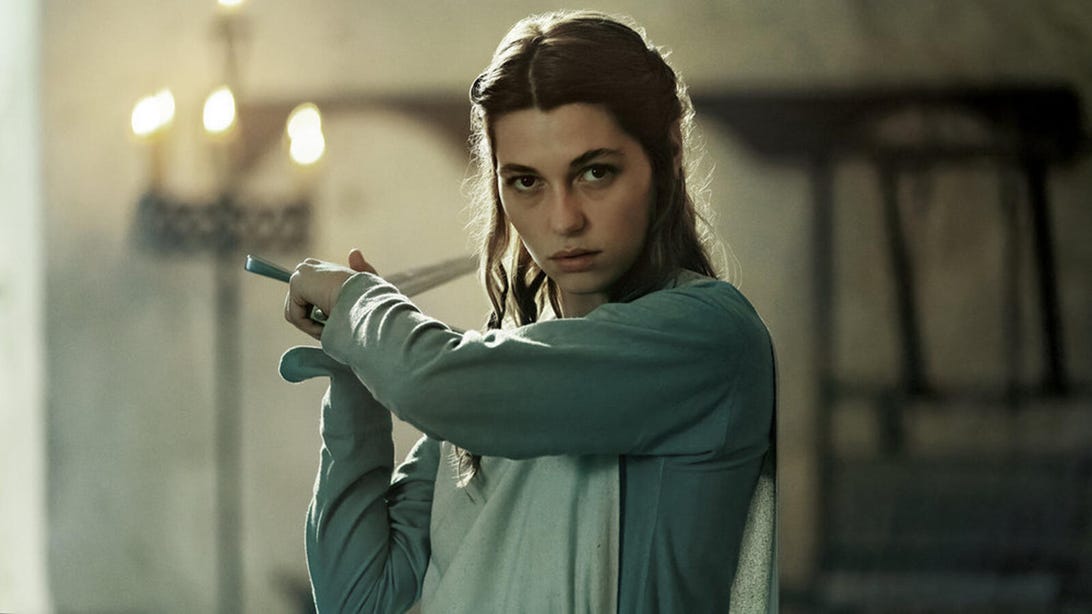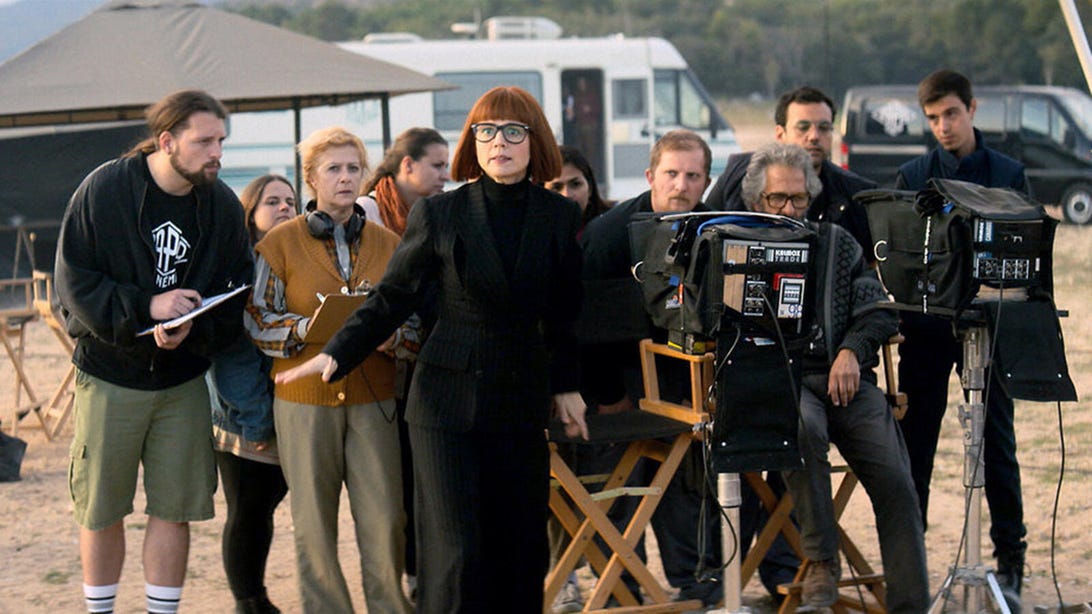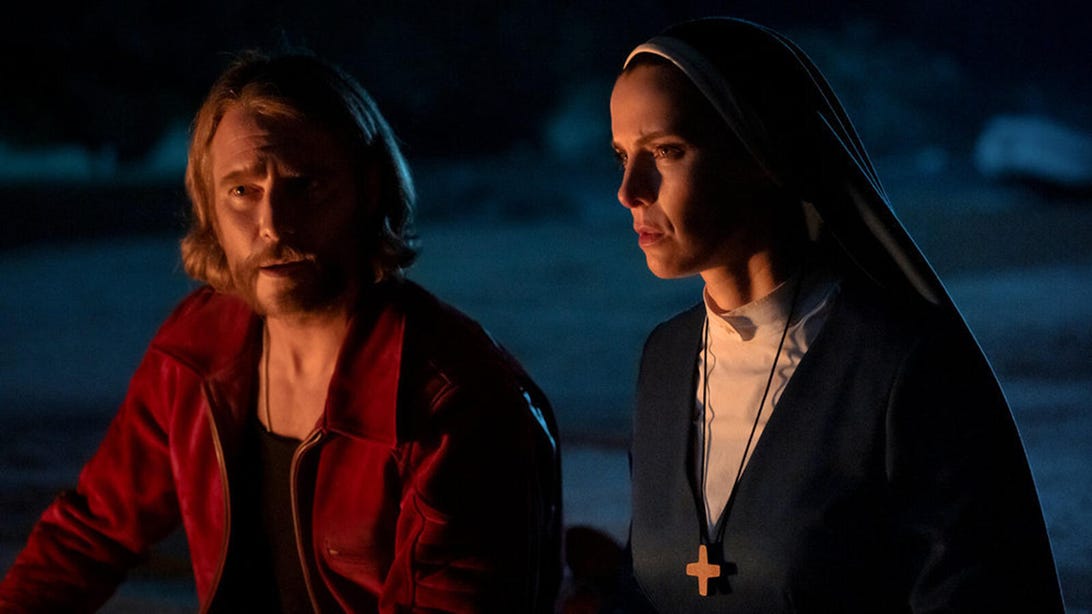Join or Sign In
Sign in to customize your TV listings
By joining TV Guide, you agree to our Terms of Use and acknowledge the data practices in our Privacy Policy.
Mrs. Davis Director Owen Harris on Creating the Most Expensive Commercial Never Made
Plus, exploding heads!

Mathilde Ollivier, Mrs. Davis
Sophie Kohler/Peacock[Warning: The following contains spoilers for Episode 5 of Mrs. Davis, "A Great Place to Drink to Gain Control of Your Drink." Read at your own risk!]
Mrs. Davis just unearthed a mysterious tape, thanks to the pope, that points to the location of the Holy Grail. What is she going to do next? She's making a Super Bowl commercial.
Tara Hernandez and Damon Lindelof's deliciously out-there Peacock series hits new heights in its fifth episode, the first episode of Mrs. Davis to be released since the first four installments dropped all at once on April 20. That first batch of episodes ended on a walloping "what the f---?" tease, revealing that the intro to the whole show, a dramatic scene set in 14th century France, was actually an unaired commercial for sneakers — the exact same sneakers Wiley (Jake McDorman) was gifted by the algorithm. The taped commercial ended with a blackmail note from its star, Clara (Mathilde Ollivier), as she rocked the Grail like a baby.
Got all that? Mrs. Davis is just getting started. The fifth episode is the deliriously fun and surprisingly moving story behind that tape, as told by Professor Arthur Schrodinger (Ben Chaplin), who turns out to be Clara's father. He spent years working with Clara to destroy the Grail after she stole it from the set of the commercial. As for that commercial, it's a wannabe Super Bowl ad for British Knights shoes, directed in the early '90s by Clara's mother, Mathilde (Katja Herbers), a pantsuit-wearing Sister of the Coin who's dedicated her life to the Grail's protection — and, apparently, to ensuring its global visibility, hence the high-budget commercial, which Father Ziegler (Tom Wlaschiha) financed with the Vatican's stolen funds.
There isn't a note the episode doesn't hit. "It's a show where you're juggling a lot of things," director and executive producer Owen Harris told TV Guide. "And then you get to [Episode] 5, and you're juggling everything." There's big comedy on the set of the commercial, where Herbers is pitch perfect as the zealous French director. There's also bloody action and swordplay in the fake 1300s. But the hour, written by Nadra Widatalla and Jason Ning, moves to a place of sincere feeling once Schrodinger and Clara meet. It's a story of love and loss that only Mrs. Davis could pull off: Father and daughter bond as they try everything to destroy the object that monopolized Mathilde's affection, only for Clara's head to explode, literally, when she breaks the cardinal rule and sips from the Grail.
As for Simone (Betty Gilpin) and Wiley, they're the story's rapt audience in the present, sitting by the campfire on Schrodinger's desert island. But they're part of this, too: When they were kids, Clara's liver went to both of them after she died. Schrodinger believes the liver might make them immune to the Grail's toxic properties, but if they want to test his theory, they'll have to recover the Grail from the belly of the sperm whale he fed it to. The hour ends with Simone accepting that ridiculous but possibly deadly challenge, echoing Clara's last words: "Whatever it takes."
Harris, whose other credits include Black Mirror hits like "San Junipero," also directed Mrs. Davis' first two episodes and the season finale, but he had more worries about directing Episode 5 than any other episode this season. "You're asking the viewer to accept a lot," he said. New characters arrive and take the spotlight, while the two main characters mostly hang out on a beach, listening to the story. But the leap paid off; Episode 5 is a highlight of the show's first season. "It's probably the one episode that I went from fearing to completely falling in love with," Harris said. Here, he spoke with TV Guide about filming a fake Super Bowl commercial, landing the emotional resonance of an exploding head, and finding the right French song to play when the head was exploding.

Katja Herbers, Mrs. Davis
PeacockWhat was it like to direct an episode about directing? How do you approach that?
Owen Harris: The directing side of it was slightly tongue-in-cheek and heightened, in terms of your neurotic, highly strung, crazy director — which probably is all of us, actually. But no, it was lots of fun. And more than anything, I think Katja, who played Mathilde, had a lot of fun doing it. Especially for actors — you spend your lives around each other, directors and actors, so to be able to sort of rip us off was quite fun, I think. And the whole episode uses that as a conceit to continue to build this whole legend of the Holy Grail. So you're watching the story within a story, but at the same time, you're using it to give away little breadcrumbs of information.
What kind of conversations did you have with Katja about how big she should go in those scenes when she's directing?
Harris: I always like the actor to take the lead… It's nice for the actor to start with something that comes from their gut and what they've taken from the script and how they're feeling about it. And then my job, I often feel, is just like a tuning fork, which is to try and take little moments and subtle macro elements of what they're doing and either magnify them or bring them in a little bit, and it was just like that with Katja. You could tell she enjoyed doing it. That whole backstory is really fun. And we're telling a story that's being told by one of our characters, Schrodinger, so it needs to feel a little bit heightened — a bit of the Princess [Bride] feel to it, where you start to retell the story, and then when you pop back into the world that you're being told about, it has its own tonality to it. It feels a little bit like a picture book, so the characters in it need to have their own world created around them.
And you directed the premiere, which opens with this commercial, but at the time, the audience doesn't know that it's a commercial. How did you find the balance between making it work as an introduction to the whole show, but also making it heightened enough to work as a Super Bowl commercial?
Harris: I came out of shooting commercials, so I remember the time when there were ridiculous budgets in commercials. I mean, there still are, but when it was sort of a thing, and everyone was trying to outdo each other with production value. You can imagine [Mathilde] seeing Gladiator or something and saying, "It needs to look like that. No expense spared." So it was fun to set our sights on trying to create a world that had this high production value, felt epic, felt slightly over the top. And in a way, we had to treat that separately to the rest of the show, because you need to then discover that it is a different thing. But at the same time, you don't want to give the game away entirely when you jump from the opening of the pilot into the desert island. It can't feel so completely removed as to make you think, "Oh, I was watching a thing." It was about finding that balance between the two, and I think we just about get away with it, because it's so ridiculous that you go from this ridiculous beheading, this crazy fight scene, and suddenly [you're] on a desert island in the present day. So you get away with the slight difference in tone and look.
I love Simone and Wiley as the audience of this story that Schrodinger is telling. There's a real innocence to them. How did you keep those scenes feeling fresh?
Harris: It was towards the end of the schedule [when those scenes were filmed]. And they'd been in pretty much every scene, certainly Betty. So there was a certain element of, like, they were on a beach, the sun was shining. And it was fun! I think one of the hardest things for me on that entire shoot in [Episode] 5 was the cat, who just wouldn't behave. But by that point in the show, they had developed such a wonderful, easy chemistry. And Ben Chaplin, who plays Schrodinger, is fun, and he's constantly got anecdotes that have got nothing to do with the script. So there was always this lovely, good energy in and around that campfire scene. And they'd try stuff; they'd mess about. It has that flavor of two kids being told a great story… It needs to be like a campfire tale that we're going to be told, so you get this sense of enjoyment out of that.
There's one speech that Ben delivers that is like, I don't know, seven pages. It was insane. And I remember him coming up to me in the day, just before it, and he says, "I don't know how it's gonna go today. I'll be honest with you." And I'm like, "What do you mean? You're going to nail it." And he did. He sort of sallies forth and we get this wonderful speech out of him, and they're sat there captivated. So a lot of that energy was quite natural.

Jake McDorman and Betty Gilpin, Mrs. Davis
Sophie Kohler/PeacockAs you mentioned, there are some decapitations in this episode. The ones in the commercial are fake, and then Clara's head explodes for real. Did you approach her head exploding differently than the more cartoonish violence of the commercial?
Harris: Yeah, it's such an arresting moment. That and also just tonally how it plays within the show, because as you say, you've had these other head-exploding, decapitation moments. So there was a real sense of trying to create a bit more gravity around it, and how you build to that scene, and how you try and forge a connection between [Clara] and Schrodinger in the short amount of screen time that we actually get to see them… How do you create this connection between them so that when it happens, it genuinely is shocking? But at the same time, there's always a sense of humor undercutting everything. I love the way it plays, because it sort of shocks you. It's sad, but there's also something bizarrely bizarre in the whole [scene] that fits within the tonality of Mrs. Davis, that allows you to just not sit there and weep but sort of get on with the show at the same time. It's a really clever bit of storytelling.
The way we set about it was to create this mood where you have an intimate scene and then just pull back a moment. I had a choice to make, whether or not she's there and her head explodes or whether we just step back a little bit to see it, and [stepping back] felt like the right thing to do to be able to land the different tones that we're trying to juggle at the time. But it still has that sense of shock.
I thought it absolutely landed.
Harris: It's got a lovely piece of music in it as well. This French track, which I love, which I then started playing in my car ever since. And all those bits come together to pull off this moment, which is meant to take you completely by surprise, but also land something quite painful and emotional.
I noticed that that song is called "Les fleurs," and Clara's last name is LaFleur, and it's by an artist with the first name Clara, Clara Luciani. Was that song found after the character was named?
Harris: Yeah, it was, totally. I know that the editor, Andrew [Behrens], had been searching around, he had been on a sort of sabbatical in French music ever since he knew about Episode 5 and had been playing around with different tracks. And then when we got to the edit, he and I shared different ideas for different French tracks for the mix. In a funny way, the reference that I was using visually, in terms of a sort of storybook feel, was Amelie, just because it felt like a fun thing to heighten it all to that level, but then pull it back in terms of character and drama to make it more grounded. I think it was Andrew that found that track, and when he put it on the cut, it was just like, boom. That's the scene. It's amazing.
New episodes of Mrs. Davis premiere Thursdays on Peacock.
